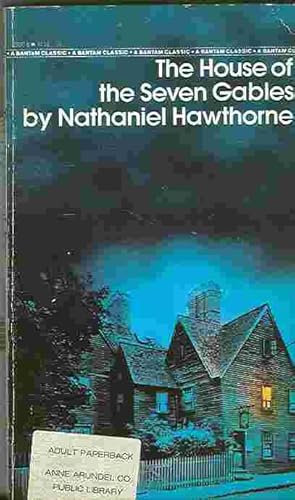"For example, then," continued Holgrave. "A dead man, if he happen to have made a will, disposes of wealth no longer his own; or, if he die intestate, it is distributed in accordance with the notions of men much longer dead than he. A dead man sits on all our judgment seats; and living judges do but search out and repeat his decisions. We read in dead men's books! We laugh at dead men's jokes, and cry at dead men's pathos! We are sick of dead men's diseases, physical and moral, and die of the same remedies with which dead doctors killed their patients! We worship the living Deity according to dead men's forms and creeds. Whatever we seek to do, of our own free motion, an icy head obstructs us! Turn our eyes to what point we may, a dead man's white, immitigable face encounters them, and freezes our very heart! And we must be dead ourselves before we can have our proper influence on the world, which will be no longer our world, but the world of another generation, with which we shall have no shadow of a right to interfere. I ought to have said, too, that we live in dead men's houses; as, for instance, in this of the Seven Gables!"
In Puritan New England, Colonel Pyncheon manages to swindle the poor Matthew Maule out of a plot of land that Pyncheon uses to build a great, seven-gabled house. Maule, accused of witchcraft, uses his last breath before he is hanged to curse the house and the Pyncheon family, declaring, "God hath given them blood to drink!" And true enough, on the day of his housewarming party, Colonel Pyncheon is found dead in his study as if by an unseen hand.
The main narrative of The House of Seven Gables occurs 150 years later, as the Pyncheon family, having come down in the world, still struggles under the weight of Maule's curse. The only inhabitants of the House of the Seven Gables are Hepzibah, an elderly woman forced to open a store to make ends meet, and a daguerreotypist named Holgrave who rents a room. To this are quickly added the sunny, saintly Phoebe, a Pyncheon cousin, and Clifford Pyncheon, released after thirty years of wrongful imprisonment and unsurprisingly maladjusted to the outside world. A wealthy cousin, Judge Jaffrey Pyncheon, lurks at the edge of the story with some very vague evil intent.
Once you take Hawthorne's prose with a grain of salt, his books are a lot of fun. He violates that first principle of modern writing--show, don't tell--with such gleeful abandon and wordiness that I often laugh. At the same time, his writing is not very difficult, on the level of the sentence, and there's something delightful about the sheer weirdness and silliness he's capable of. (I particularly like the detail of the old chicken family, made imbecile by inbreeding, that Hawthorne uses as a representation of the Pyncheons.) And he also manages to capture really finely nuanced human emotions and relationships in a way that the modern show-don't-tell-iness leaves intentionally vague.
The best parts of The House of Seven Gables are all historical: the story of Colonel Pyncheon and Matthew Maule, and another interstitial story about a descendant of Maule who uses his powers of mesmerism to bind young Alice Pyncheon to him for life. The "modern-day" narrative, which tries to show us how the curse lives on in the penury of Hepzibah and the injustice done against Clifford, shies away from a direct approach of the supernatural and puts more demands on the reader's patience. The novel's major flaw is that Hawthorne jealously reserves two pieces of crucial information until the end--spoiler alert: that Holgrave is a descendant of Matthew Maule, and that it's Jaffrey Pyncheon who committed the murder for which Clifford took the fall. Hawthorne reserves these facts to give us a kind of typical Gothic reveal at the end, but I wonder if knowing these things wouldn't deepen the relationships between Holgrave and Phoebe--thrust together from warring families like Romeo and Juliet--or Clifford and Jaffrey. (It seems typically Hawthornean that Jaffrey's whole role in the story is to walk past the house and be menacing, then finally get inside and immediately die in an arm chair.)
The big theme of The House of Seven Gables is the past: the way that it exerts an effect on the living, and the possibility of escape or reconciliation. Holgrave's marriage to Phoebe and the death of Jaffrey, who looks exactly like the portrait of old Colonel Pyncheon, put the curse to rest once and for all. In this way it doesn't have the complexity or conflicted nature of The Scarlet Letter. Like a lot of Gothic novels, it really has a heart of pure sunshine.


No comments:
Post a Comment